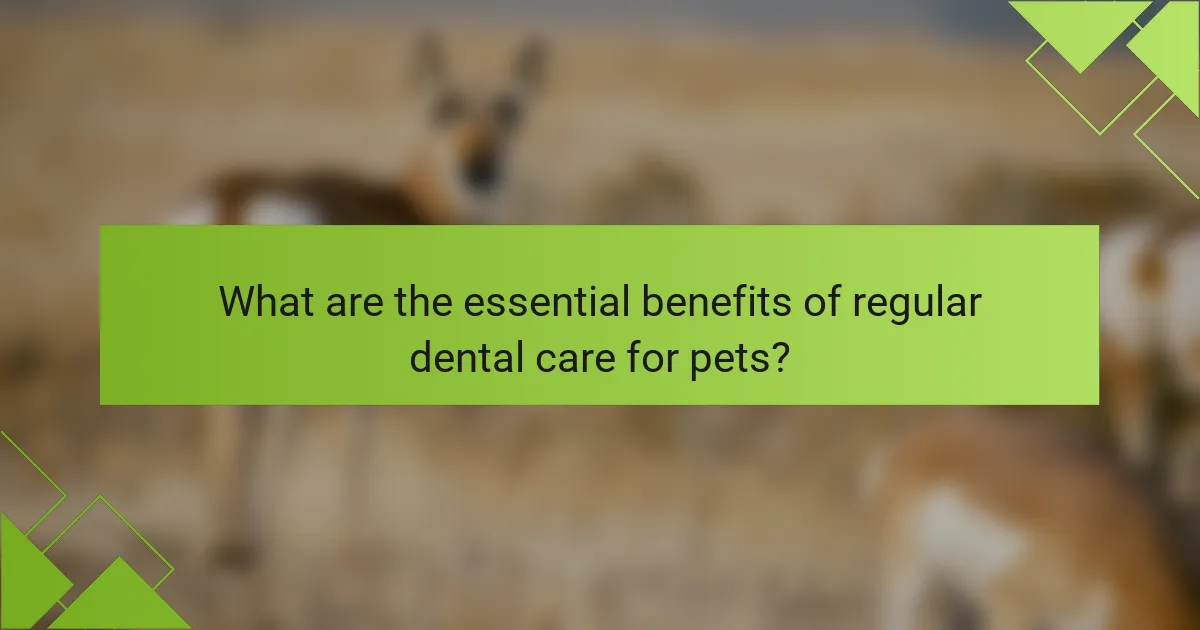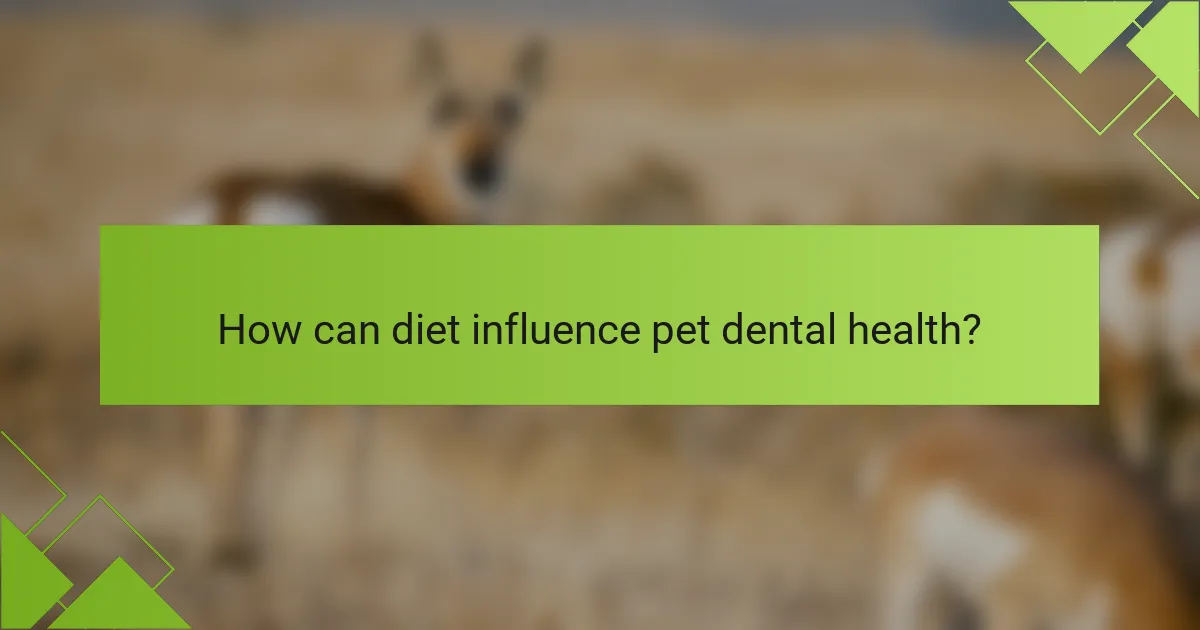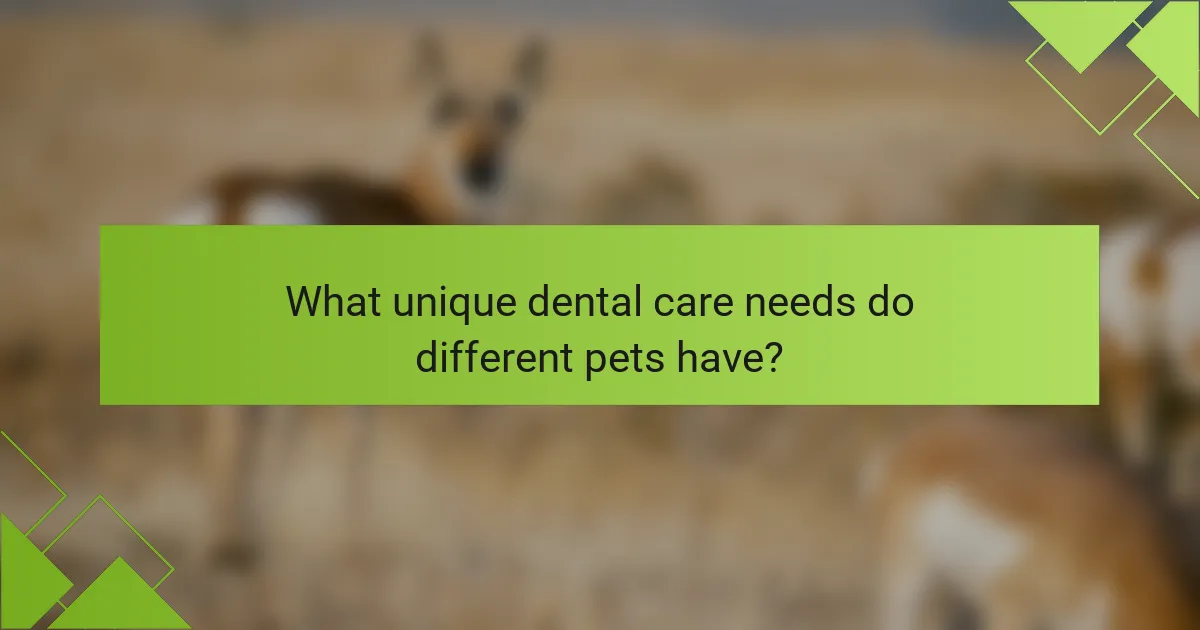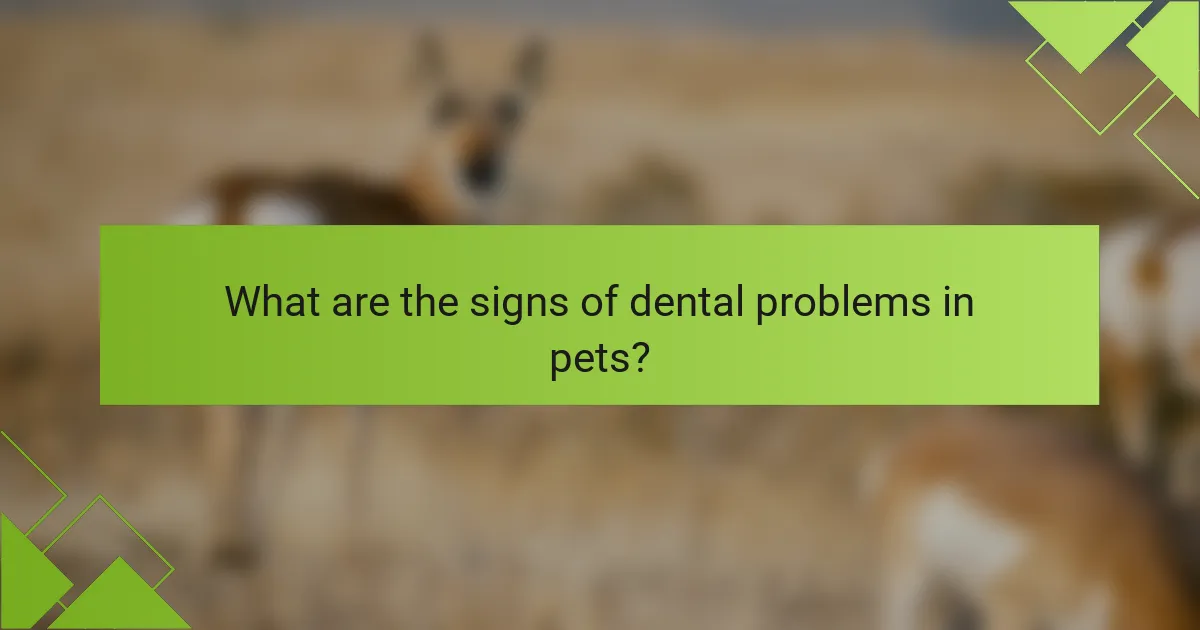Proper dental care for pets is vital for their health and longevity. This article covers essential practices like daily brushing, providing dental chews, and scheduling regular veterinary check-ups. It also discusses how diet impacts oral hygiene and highlights signs of dental issues to monitor. Understanding these best practices can significantly enhance your pet’s quality of life.

What are the essential benefits of regular dental care for pets?
Regular dental care for pets significantly improves their overall health and longevity. It prevents dental diseases, reduces bad breath, and promotes better nutrition. Regular brushing and dental check-ups can save on costly veterinary treatments in the long run. Additionally, maintaining oral hygiene can enhance your pet’s quality of life by alleviating pain and discomfort associated with dental issues.
How does dental health impact a pet’s overall well-being?
Dental health significantly impacts a pet’s overall well-being by preventing systemic health issues. Poor dental hygiene can lead to infections, pain, and even organ damage. Regular brushing and dental check-ups are essential practices for maintaining your pet’s oral health. These practices help reduce plaque buildup, ensuring better heart and kidney health. Additionally, providing dental treats can promote oral care while enhancing your pet’s quality of life.
Which common dental issues can be prevented through at-home care?
At-home dental care can prevent several common issues in pets, including plaque buildup, tartar formation, bad breath, and gum disease. Regular brushing and dental treats significantly reduce these problems.
1. Plaque buildup: Regular brushing removes food particles and bacteria.
2. Tartar formation: Daily care prevents hard deposits that lead to dental diseases.
3. Bad breath: Consistent oral hygiene keeps breath fresh and pleasant.
4. Gum disease: Routine cleaning helps maintain healthy gums and prevents infections.

What are the recommended daily practices for pet dental care?
Regular dental care is essential for maintaining your pet’s oral health. Recommended daily practices include brushing your pet’s teeth, providing dental chews, and scheduling regular veterinary dental check-ups.
Brushing your pet’s teeth daily helps remove plaque and prevent tartar buildup. Use a toothbrush and toothpaste specifically designed for pets. Dental chews can also be beneficial; they help reduce plaque and freshen breath while your pet chews. Regular veterinary check-ups ensure professional cleaning and early detection of dental issues.
Additionally, monitor your pet’s oral health by checking for bad breath, swollen gums, or changes in eating habits. These signs can indicate potential dental problems.
How often should you brush your pet’s teeth?
Brush your pet’s teeth at least two to three times a week. Regular dental care prevents plaque buildup and maintains oral health. Daily brushing is ideal for optimal results. Use pet-specific toothpaste and a suitable toothbrush to ensure comfort. Regular dental check-ups with a veterinarian complement at-home care.
What types of toothpaste are safe for pets?
Pet-safe toothpaste typically includes enzymatic formulas, poultry or beef flavors, and no fluoride. These types prevent dental issues and ensure safety during use. Look for products specifically designed for pets to avoid harmful ingredients. Popular brands include Vet’s Best and PetSmile, which offer effective cleaning without toxicity.
Which tools are most effective for at-home dental care?
Effective tools for at-home dental care include toothbrushes, dental wipes, and dental chews. These tools help maintain oral hygiene and prevent dental issues in pets. Regular use of a pet-specific toothbrush and toothpaste can significantly reduce plaque buildup. Dental chews provide an enjoyable way to promote gum health while cleaning teeth.

How can diet influence pet dental health?
A balanced diet significantly enhances pet dental health by reducing plaque and tartar buildup. Nutrient-rich foods, especially those with natural abrasives, help clean teeth while chewing.
Incorporating dental treats designed for pets can further promote oral hygiene. These treats often contain enzymes that combat bacteria and freshen breath.
Regularly providing fresh water is essential as it aids in rinsing food particles and bacteria from the mouth. Avoiding sugary or sticky foods can prevent dental issues.
Overall, a well-rounded diet tailored to a pet’s specific needs plays a crucial role in maintaining optimal dental health.
What types of food promote better dental hygiene?
Foods that promote better dental hygiene include crunchy fruits and vegetables, dairy products, and whole grains. These foods help reduce plaque and strengthen teeth.
1. Crunchy fruits and vegetables: Apples and carrots stimulate saliva production and clean teeth naturally.
2. Dairy products: Cheese and yogurt are rich in calcium and phosphate, which strengthen enamel.
3. Whole grains: Brown rice and whole grain bread provide fiber and help maintain gum health.
4. Nuts: Almonds and walnuts contain healthy fats and minerals that contribute to oral health.
Are dental treats beneficial for pets?
Yes, dental treats can be beneficial for pets. They help reduce plaque and tartar buildup, promoting better oral health. Many dental treats contain ingredients designed to freshen breath and strengthen gums. Regular use, combined with routine brushing, enhances overall dental care.

What unique dental care needs do different pets have?
Different pets require tailored dental care to address their unique needs. Dogs often benefit from chew toys that promote dental health, while cats may need specialized dental treats to reduce plaque. Small animals like rabbits require frequent dental checks due to continuously growing teeth. Regular brushing is essential across all species to prevent dental disease. Additionally, some pets may need professional cleanings based on their specific dental conditions.
How does dental care differ between dogs and cats?
Dental care for dogs and cats differs primarily in techniques and products used. Dogs often require brushing with dog-specific toothpaste, while cats may benefit from dental treats or water additives.
For dogs, regular brushing helps prevent plaque buildup. They may also need professional cleanings based on their breed and dental health. In contrast, cats are more prone to periodontal disease, making routine vet check-ups essential.
Unique attributes include dogs’ tendency to chew on toys for dental health, while cats may prefer softer food options that are easier on their teeth.
Both pets benefit from consistent dental care routines to maintain oral health and prevent complications.
What specific considerations are there for senior pets?
Senior pets require special attention in dental care due to their unique health needs. Regular dental check-ups are crucial, as older pets are more prone to periodontal disease. Use softer toothbrushes and pet-safe toothpaste to accommodate sensitive gums. Monitor for signs of discomfort or changes in eating habits, as these may indicate dental issues. Additionally, consider dental treats designed for senior pets to promote oral health while being gentle on their teeth.

What are the signs of dental problems in pets?
Signs of dental problems in pets include bad breath, difficulty eating, swollen gums, and excessive drooling. Regular dental check-ups and at-home care can prevent serious issues. Monitor your pet for changes in behavior or oral health to address problems early.
How can you identify pain or discomfort related to dental issues?
To identify pain or discomfort related to dental issues in pets, observe changes in behavior, eating habits, and oral health. Common signs include reluctance to eat, excessive drooling, and pawing at the mouth. Regular dental check-ups and at-home assessments can help detect problems early. Look for redness, swelling, or bad breath, which may indicate underlying issues.
Which behaviors indicate your pet may need dental care?
Signs your pet may need dental care include bad breath, difficulty eating, swollen gums, and visible tartar buildup. Regular dental checks are essential for maintaining your pet’s overall health. Early detection of dental issues can prevent more serious health problems. Monitor your pet for changes in behavior, such as increased drooling or pawing at their mouth.

What are the rare but serious dental conditions to watch for?
Rare but serious dental conditions to watch for include feline odontoclastic resorptive lesions, canine periodontal disease, and oral tumors. These conditions can severely impact your pet’s health and require prompt veterinary attention. Regular dental check-ups and at-home care can help identify these issues early. For example, watch for signs like difficulty eating, bad breath, or visible oral lesions.
What is periodontal disease and how can it affect pets?
Periodontal disease in pets is an infection of the tissues surrounding teeth, leading to pain and tooth loss. It can also result in systemic health issues, affecting organs like the heart and kidneys. Best practices for pet dental care at home include regular brushing, providing dental treats, and scheduling professional cleanings. These measures help maintain oral health and prevent periodontal disease. Regular dental care can enhance your pet’s overall well-being and longevity.
How does tooth resorption occur in cats, and what are its implications?
Tooth resorption in cats occurs when the body starts to break down and absorb the tooth structure, often leading to pain and tooth loss. This condition can have significant implications for a cat’s dental health and overall well-being. Regular dental care at home, such as brushing and providing dental treats, can help prevent this issue. Early detection is crucial; symptoms may include discomfort while eating, excessive drooling, or changes in behavior. Consulting a veterinarian for thorough dental assessments is essential to manage tooth resorption effectively.

What expert tips can enhance your pet’s dental care routine?
Regular dental care is crucial for your pet’s health. Here are expert tips to enhance your pet’s dental care routine:
1. Brush your pet’s teeth daily using a pet-specific toothbrush and toothpaste.
2. Provide dental chews that promote oral health and reduce plaque buildup.
3. Schedule regular veterinary dental check-ups to monitor oral health.
4. Incorporate dental toys that encourage chewing and help clean teeth.
5. Offer a balanced diet that includes crunchy kibble to naturally clean teeth.
Which common mistakes should be avoided in pet dental care?
Common mistakes in pet dental care include neglecting regular brushing, using human toothpaste, skipping professional cleanings, and ignoring signs of dental disease. These oversights can lead to serious health issues for pets. Regular dental check-ups and appropriate products are essential for maintaining oral health.
How can you make dental care a positive experience for your pet?
To make dental care a positive experience for your pet, establish a routine that includes gentle brushing and regular dental check-ups. Use pet-friendly toothpaste and rewards to create a stress-free environment.
Introduce dental care gradually, starting with short sessions to build comfort. Consider dental toys and treats that promote oral health. Regular veterinary visits ensure any issues are addressed promptly, contributing to your pet’s overall well-being.
What additional resources are available for pet dental health education?
Various resources are available for pet dental health education. Veterinary clinics often provide brochures and informational sessions on dental care. Online platforms, such as pet health websites and forums, offer articles and videos. Local animal shelters may host workshops on maintaining pet oral hygiene. Additionally, pet supply stores frequently have educational materials on dental products. Engaging with these resources can enhance understanding of best practices for at-home dental care.
